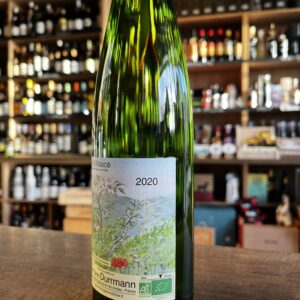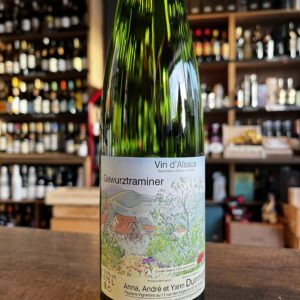-
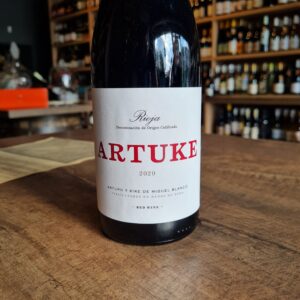 Made in a Beaujolais style, with the carbonic maceration method. This juicy ''Joven'' fresh fruited style of Rioja has zero oak influence as it ages in concrete tanks for 6 months. Farmed without any synthetic fertilizers or pesticides. Arturo Blanco was once asked what the philosophy at Bodegas Artuke was and he simply replied 'we are farmers'. The approach here is 100% focused on interpreting the family's 32 plots which are split between the villages of Baños de Ebro and Ábalos in Rioja Alavesa. Biodynamic techniques are employed in the vineyards and Arturo and Kike are also busy recovering old, ignored plots of ancient vines. Vinification is aimed at expressing the characteristics of the vineyard and quality of fruit above all else. The restrained use of oak and inclination towards different types/sizes of barrel, plus an unwillingness to adhere to the subscribed regimes for classification means that Artuke are precluded from using Crianza, Reserva and Gran Reserva designations on their wines. This mouth-watering red wine takes a relatively deep chill which makes it a versatile pairing with all types of food: tuna, pretty much anything made with zucchini, fried chicken, gooey cheese sandwiches, pizza, etc…
Made in a Beaujolais style, with the carbonic maceration method. This juicy ''Joven'' fresh fruited style of Rioja has zero oak influence as it ages in concrete tanks for 6 months. Farmed without any synthetic fertilizers or pesticides. Arturo Blanco was once asked what the philosophy at Bodegas Artuke was and he simply replied 'we are farmers'. The approach here is 100% focused on interpreting the family's 32 plots which are split between the villages of Baños de Ebro and Ábalos in Rioja Alavesa. Biodynamic techniques are employed in the vineyards and Arturo and Kike are also busy recovering old, ignored plots of ancient vines. Vinification is aimed at expressing the characteristics of the vineyard and quality of fruit above all else. The restrained use of oak and inclination towards different types/sizes of barrel, plus an unwillingness to adhere to the subscribed regimes for classification means that Artuke are precluded from using Crianza, Reserva and Gran Reserva designations on their wines. This mouth-watering red wine takes a relatively deep chill which makes it a versatile pairing with all types of food: tuna, pretty much anything made with zucchini, fried chicken, gooey cheese sandwiches, pizza, etc… -
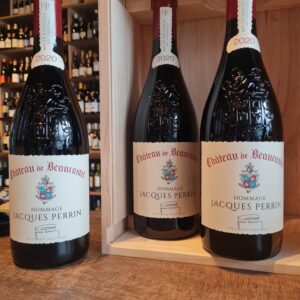 The Perrin family of Châteauneuf-du-Pape are one of the Rhône Valley’s greatest vineyard owners. With over 200 hectares of top level, prime vineyards at their fingertips, they have the terroir and skill required to produce some of the region’s finest wines. The estate traces its history back to a plot of Coudoulet vines bought by Pierre de Beaucastel in 1549. The estate was transferred into the Perrin family in 1909 through marriage, where it remains firmly to this day. Despite being one of the old guards of the region, they are also one of the most progressive estates. They were one of the first converts to organic and biodynamic faming in Châteauneuf-du-Pape, which they adopted in 1950 and 1974 respectively. A legendary Châteauneuf-du-Pape wine, Hommage à Jacques Perrin by Château de Beaucastel is one of the world's greatest wines. It brilliantly embodies the motto of the Perrin family: "A Grand Vin embodies emotion and civilisation, a legend that transcends time." The first vintage of this prestigious wine was produced in 1989. Produced in very limited quantities, the Hommage à Jacques Perrin wine comes from a unique terroir composed of rolled pebbles upon clay-limestone and silt soils in an exceptional vineyard located in the northern part of the Châteauneuf-du-Pape appellation, in the Rhône Valley. Vintage 2020 was relatively mild, the winter was punctuated by an episode of frost which had little impact on the vineyards, even the earliest plots. While the mildness of spring favoured vegetative development, a constant wind kept the soil cool. The hot, sunny summer was marked by both coolness and temperature variations between day and night, ideal conditions for ensuring a high-quality and even ripening of the grapes. Harvested at perfect maturity, the juicy and balanced grapes gave rise to a fine vintage.
The Perrin family of Châteauneuf-du-Pape are one of the Rhône Valley’s greatest vineyard owners. With over 200 hectares of top level, prime vineyards at their fingertips, they have the terroir and skill required to produce some of the region’s finest wines. The estate traces its history back to a plot of Coudoulet vines bought by Pierre de Beaucastel in 1549. The estate was transferred into the Perrin family in 1909 through marriage, where it remains firmly to this day. Despite being one of the old guards of the region, they are also one of the most progressive estates. They were one of the first converts to organic and biodynamic faming in Châteauneuf-du-Pape, which they adopted in 1950 and 1974 respectively. A legendary Châteauneuf-du-Pape wine, Hommage à Jacques Perrin by Château de Beaucastel is one of the world's greatest wines. It brilliantly embodies the motto of the Perrin family: "A Grand Vin embodies emotion and civilisation, a legend that transcends time." The first vintage of this prestigious wine was produced in 1989. Produced in very limited quantities, the Hommage à Jacques Perrin wine comes from a unique terroir composed of rolled pebbles upon clay-limestone and silt soils in an exceptional vineyard located in the northern part of the Châteauneuf-du-Pape appellation, in the Rhône Valley. Vintage 2020 was relatively mild, the winter was punctuated by an episode of frost which had little impact on the vineyards, even the earliest plots. While the mildness of spring favoured vegetative development, a constant wind kept the soil cool. The hot, sunny summer was marked by both coolness and temperature variations between day and night, ideal conditions for ensuring a high-quality and even ripening of the grapes. Harvested at perfect maturity, the juicy and balanced grapes gave rise to a fine vintage. -
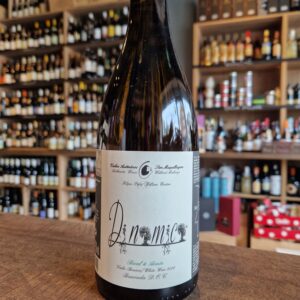 Filipa Pato and husband, William Wouters have created an expressive range of wines representing the native grape varietals of the Barriada region. Their philosophy is simple: "create authentic wines without make-up to express the true nature of the vineyards they come from". Bairrada is a coastal DOC which borders Vinho Verde, Dão and Lisboa. It has mild and wet winters and hot windy summers. The climatic thermal range, brought about by the Atlantic influence, brings high acidity and freshness to the grapes here. Filipa and William practice biodynamic viticulture and are undergoing conversion to organic certification. The wine is unfined. Drink with sheep and goats cheese, dressed salads, and delicate poultry dishes.
Filipa Pato and husband, William Wouters have created an expressive range of wines representing the native grape varietals of the Barriada region. Their philosophy is simple: "create authentic wines without make-up to express the true nature of the vineyards they come from". Bairrada is a coastal DOC which borders Vinho Verde, Dão and Lisboa. It has mild and wet winters and hot windy summers. The climatic thermal range, brought about by the Atlantic influence, brings high acidity and freshness to the grapes here. Filipa and William practice biodynamic viticulture and are undergoing conversion to organic certification. The wine is unfined. Drink with sheep and goats cheese, dressed salads, and delicate poultry dishes. -
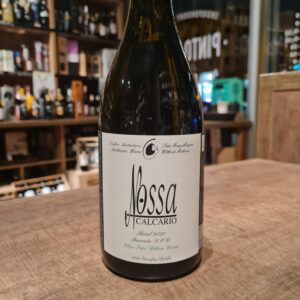 This mineral-driven white wine from Filipa Pato is akin to top quality white Burgundy. Using the Bical grape, the wine is aged in old French oak barrels and displays a great balance between creamy richness and lean minerality. Following in the footsteps in the winemaking traditions of her well-known father, Luis, Filipa Pato has now, in her own right, garnered a reputation for producing a superb range of wines in the heart of Bairrada, in Ois do Bairro. Focussing on Bairrada’s local native grape varieties, Filipa’s top-level white. It should be served not too cold, decanted into elegant glasses. It goes well with cheeses, fish dishes and salads.
This mineral-driven white wine from Filipa Pato is akin to top quality white Burgundy. Using the Bical grape, the wine is aged in old French oak barrels and displays a great balance between creamy richness and lean minerality. Following in the footsteps in the winemaking traditions of her well-known father, Luis, Filipa Pato has now, in her own right, garnered a reputation for producing a superb range of wines in the heart of Bairrada, in Ois do Bairro. Focussing on Bairrada’s local native grape varieties, Filipa’s top-level white. It should be served not too cold, decanted into elegant glasses. It goes well with cheeses, fish dishes and salads. -
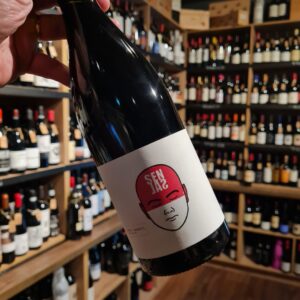 Javier Revert Viticultor is the personal project of Javi Revert, oenologist and part of the technical team of Celler del Roure since 2009. It all started in 2014, when Javier started to recover a vineyard planted by his great-grandfather in the highest area of Font de la Figuera, an area influenced by the Mediterranean character and the harsh winter of La Mancha. It was in the 2016 vintage when their first wines were launched. Javier Revert is one of the young winemakers who tries to interpret the landscape, looking for the best orientations, recovering abandoned vineyards and planting new ones with historical varieties from the area. Javier Revert Sensal is a red wine made with Red Grenache and Monastrell from a 0.8-hectare vineyard with the same name planted in 1965 at 700 metres of altitude on clayey, fresh and slightly clayey soils. Rice dishes, White meats, Charcuterie, Red meat
Javier Revert Viticultor is the personal project of Javi Revert, oenologist and part of the technical team of Celler del Roure since 2009. It all started in 2014, when Javier started to recover a vineyard planted by his great-grandfather in the highest area of Font de la Figuera, an area influenced by the Mediterranean character and the harsh winter of La Mancha. It was in the 2016 vintage when their first wines were launched. Javier Revert is one of the young winemakers who tries to interpret the landscape, looking for the best orientations, recovering abandoned vineyards and planting new ones with historical varieties from the area. Javier Revert Sensal is a red wine made with Red Grenache and Monastrell from a 0.8-hectare vineyard with the same name planted in 1965 at 700 metres of altitude on clayey, fresh and slightly clayey soils. Rice dishes, White meats, Charcuterie, Red meat -
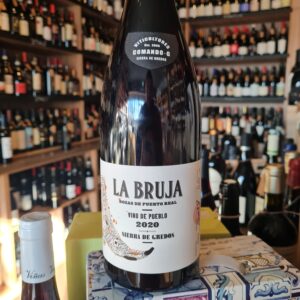 Daniel Landi and Fernando García have been friends since college. Successful winemakers in their own right – Dani at his family’s estate, Bodegas Jimenez-Landi and Fer at Bodega Marañones - in 2008 they started a winemaking project together: Comando G. Along with the pioneers of Priorat, Dani and Fer are redefining Garnacha, previously viewed as a workhorse variety, into something that can rival the elegance and finesse of Burgundian Pinot Noir or Syrah in the northern Rhône. The duo work with several small, isolated plots perched high up in the mountainous Sierra de Gredos to create truly unique, terroir-expressive wines. The vineyards that Daniel and Fernando have assembled are all farmed biodynamically, with vines ranging in age from 50 to 80 years old. According to Wine Advocate writer Luis Gutierrez, "they improve their vineyards from the moment they buy or rent them [...] The quality of their wines is what they strive to improve the most, and the results are there.” In the winery their winemaking is considered and precise, gently coaxing out the delicate balance of fruit character and terroir from each site. It is this commitment to a sense of place, nuance, and finesse that make their wines among the most compelling in Spain.
Daniel Landi and Fernando García have been friends since college. Successful winemakers in their own right – Dani at his family’s estate, Bodegas Jimenez-Landi and Fer at Bodega Marañones - in 2008 they started a winemaking project together: Comando G. Along with the pioneers of Priorat, Dani and Fer are redefining Garnacha, previously viewed as a workhorse variety, into something that can rival the elegance and finesse of Burgundian Pinot Noir or Syrah in the northern Rhône. The duo work with several small, isolated plots perched high up in the mountainous Sierra de Gredos to create truly unique, terroir-expressive wines. The vineyards that Daniel and Fernando have assembled are all farmed biodynamically, with vines ranging in age from 50 to 80 years old. According to Wine Advocate writer Luis Gutierrez, "they improve their vineyards from the moment they buy or rent them [...] The quality of their wines is what they strive to improve the most, and the results are there.” In the winery their winemaking is considered and precise, gently coaxing out the delicate balance of fruit character and terroir from each site. It is this commitment to a sense of place, nuance, and finesse that make their wines among the most compelling in Spain. -
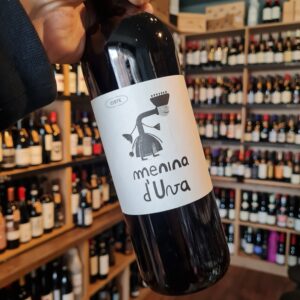 Menina d’Uva is a small winery located in Uva, a remote village in the quiet and desolate countryside of the Northeast of Portugal. Female winemaker Aline Domingues moved from Paris to this area from which her parents had emigrated to Paris to give their children better opportunities. A controversial move within the family but one that I wholeheartedly support. Aline clearly is a talented winemaker crafting beautifully pure wines. Made from 70% red grapes (including Bastardo, known in the Jura as Trousseau) and 30% white grapes including Malvasia and white Bastardo. It’s still a hearthy red that’s crispy and refreshing; cherries, pomegranate with a beautiful smell of the forest. Highly recommended.
Menina d’Uva is a small winery located in Uva, a remote village in the quiet and desolate countryside of the Northeast of Portugal. Female winemaker Aline Domingues moved from Paris to this area from which her parents had emigrated to Paris to give their children better opportunities. A controversial move within the family but one that I wholeheartedly support. Aline clearly is a talented winemaker crafting beautifully pure wines. Made from 70% red grapes (including Bastardo, known in the Jura as Trousseau) and 30% white grapes including Malvasia and white Bastardo. It’s still a hearthy red that’s crispy and refreshing; cherries, pomegranate with a beautiful smell of the forest. Highly recommended. -
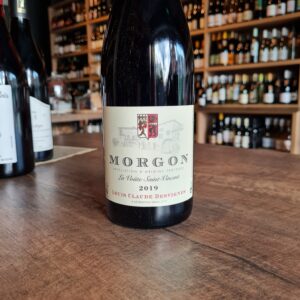 Louis-Claude Desvignes is a family estate that dates back to 1700. The Desvignes range is "La Voûte Saint Vincent", named for the vault or "voûte" of the old family house and for the patron saint of winemakers. It was Louis-Claude who began to turn the estate’s grapes into wine, and now with the reins handed over to his two sons Louis-Benoît and Claude-Emmanuelle Desvignes. It is a blend of certified-organic estate parcels totalling 4.5 hectares in the climat of Douby, which lies in the northeast corner of Morgon along the border of Fleurie. The La Voûte vines average 50 years old and are planted in Douby's typical sandy, decomposed-granite soils. Viticulture and vinification are consistent across all Desvignes wines. In the case of La Voûte, the parcels are all vinified separately.
Louis-Claude Desvignes is a family estate that dates back to 1700. The Desvignes range is "La Voûte Saint Vincent", named for the vault or "voûte" of the old family house and for the patron saint of winemakers. It was Louis-Claude who began to turn the estate’s grapes into wine, and now with the reins handed over to his two sons Louis-Benoît and Claude-Emmanuelle Desvignes. It is a blend of certified-organic estate parcels totalling 4.5 hectares in the climat of Douby, which lies in the northeast corner of Morgon along the border of Fleurie. The La Voûte vines average 50 years old and are planted in Douby's typical sandy, decomposed-granite soils. Viticulture and vinification are consistent across all Desvignes wines. In the case of La Voûte, the parcels are all vinified separately.


